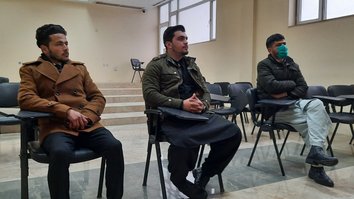TAKHAR -- Officials of private universities in Takhar province have expressed concern over the sharp decline in student enrolment since August 2021, with some institutions reporting an 80% drop in student numbers.
The dropout rate is due to the economic situation in the province, ongoing political instability and restrictions on women's education, they said.
Abdul Maroof Arifi, president of Rah-e-Saadat Private University, told Salaam Times that before August 2021, the school had 3,500 students, a portion of whom were girls.
But now, unfortunately, girls do not have the right to education, he said.
![Afghan women hold placards during a protest in front of Kabul University in Kabul on October 18. [AFP]](/cnmi_st/images/2023/07/18/43051-afghan-women-uni-585_329.jpg)
Afghan women hold placards during a protest in front of Kabul University in Kabul on October 18. [AFP]
"We have only 700 students now, a [fourfold] decline."
Brain drain, increasing household poverty, the ban on women's education, lack of motivation and youth frustration with the lack of employment opportunities in the country are some of the factors behind dropping out from private educational institutions, Arifi said.
"There are now 10 students in classes that once had 50 students," he said. "Some private universities have either suspended their activities or are listed for sale."
"We want the ban on girls' education to be lifted so private educational institutions can stand on their feet again," Arifi added.
Zabiullah Khalid, vice president for academic affairs of Paiman Institute of Higher Education in Takhar, also expressed concerns about the current situation.
He said the recent developments have negatively impacted educational institutions and the ban on women's education and economic problems are some of the factors behind the youth apathy toward education.
"Our institute had more than 1,000 students before [August 2021], but now it is not more than 200, a decline of 80% in enrolment," he said.
"Most of the youth fled the country because of the restrictions on education, while some others dropped out because of economic problems," he added.
"People have lost interest in education, and everyone is trying to find food," he said, warning that if the situation remains unchanged, the rest of the educational institutions in the country may close.
But Khalid added that he is hopeful that "these challenges will be addressed and we will see a stronger presence of the youth in higher educational institutions".
Shattered dreams
Malalai Sharifi, 24, once a third-year law student at Takhar University, now struggles with despair and hopelessness.
"My biggest dream was to become a judge and serve the women of my country, whose rights have always been violated, but all my hopes and dreams are shattered," she told Salaam Times.
"After the ban on girls' higher education, I had to stay home and endure my pain alone," Sharifi said.
"Like me, hundreds and thousands of other girls have been discouraged from education and live within the four walls of their home in a world of despair and disappointments," she said.
"I had one year left until graduation, but circumstances and my family's economic situation forced me to quit my education," said Nawroz Etebar, 25, who was a fourth-year economics student at a private university in Takhar.
"I was working for a private entity and attending classes in the afternoon," he added. "When I lost my job like thousands of other young [Afghans], I could no longer afford to pay for my education."
"If this abrupt change had not taken place in our country, I would have not lost my job and instead I would have obtained my master's degree and been a professional young man serving my country," he said.
Uncertain future
Some analysts and professors regard the collapse of private educational institutions as a serious threat to the future of the country.
If private educational institutions face a complete meltdown, then half of society will be deprived of education because public universities cannot meet the needs of today's generation, said Ali Ahmad Makhdoom, a political analyst in Kabul.
"Private educational institutions saw significant growth in the last two decades, and millions of Afghans were able to study at schools and universities," Makhdoom said. "The level of education rose significantly, as thousands of young people were able to obtain bachelor's, master's and Ph.D. degrees."
If the economic situation worsens and studying at private institutions becomes impossible, the sector may go out of business, pushing up unemployment and sinking society further into poverty, he warned.
Mohammad Ali Mohammadi, a professor at Kunduz University, told Salaam Times that currently, educated youth can find no suitable work opportunities.
"The youth do not have job security, and poverty and unemployment have forced some educated young Afghans, including those with master's and Ph.D. degrees, professors and the elite to turn to menial jobs such as selling things on the streets," he said.
"Around 20 to 30 students were studying in my class until late last month, but the number has decreased by half now," Mohammadi said on July 11.
"The uncertain political and economic situation in the country has robbed the youth of motivation," he said.

![Students at Paiman Institute of Higher Education are pictured January 4 in Taloqan, Takhar province. [Paiman Institute of Higher Education]](/cnmi_st/images/2023/07/18/43030-b__1_-585_329.jpg)







Obviously, unemployment and lack of job opportunities have caused many problems. Universities and private schools have collapsed in these poor populated areas because people are suffering financially and cannot afford to enroll their children in the universities and private schools. The situation is getting worse day by day. Universities and schools for girls used to be beautiful and prosperous, but now that these restrictions have been loosened for women, things have gotten worse. As long as girls are not allowed to study, things will continue to be chaotic and bad.
Reply4 Comment
The enthusiasm for education has decreased and people have become poor. All their efforts are to find a loaf of bread. 50% of the university students were girls. Now they do not have the right to get education. There is no work. All of the people are jobless. So, how can one pay for the university? Most of the boys left the country through smuggling routes, and went abroad. Half of them passed in the public universities. For these reasons, the percentage of students in private universities has decreased.
Reply4 Comment
Today, in some provinces of Afghanistan, the university entrance examination process is starting, but girls do not have the right to participate in this examination. And this right has been taken away from them because the mood of a person or a group is not prepared for education and higher education, and they have prevented the education and higher education of girls by force and cruelty; otherwise, until now, no reasonable or rational reason has been brought. Last year, they limited the education departments for girls, and this year they ultimately deprived them of education and exams. Another interesting point is that: Until this past month, they have distributed university exam forms to the girls and charged them a round-trip fee of AFN 500 per each form. In the same way, the forms were divided into 14 parts; since last year, they are being distributed the forms for the university entrance examination, they are charged a fee, but then they are deprived of the examination and education. If you deprive them of education, why do you distribute these forms and charge them fees!? Even though you know the test is not taken from them, you still charge them fees. Isn't it Haram [illegitimate] for you? They talked about the arrival of good days and told everyone to keep patience. Do you still have to keep patience, or are you fed up?
Reply4 Comment
History will never forgive the men of Afghanistan that. They did not open schools and colleges for the education of the innocent girls of their country and did not stand against the enemies of light. Exceptionally, some young people made sacrifices in this regard, but the united and powerful movement did not happen as needed. This dark era of oppression and barbarism by the enemies of education will soon end, and we believe that the shining star of light will shine on the homeland again.
Reply4 Comment